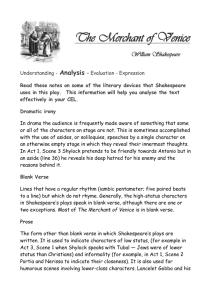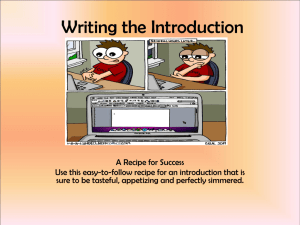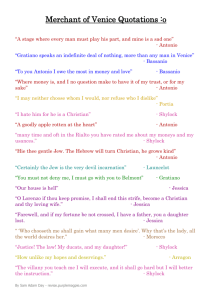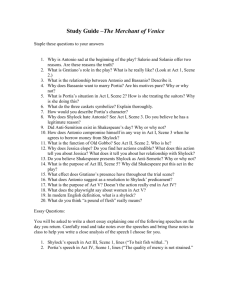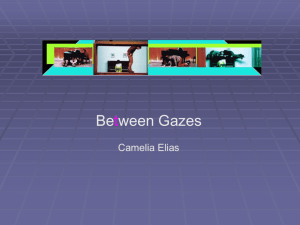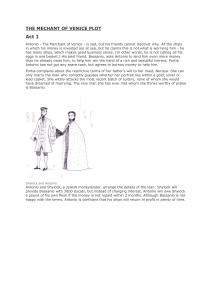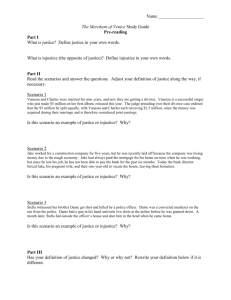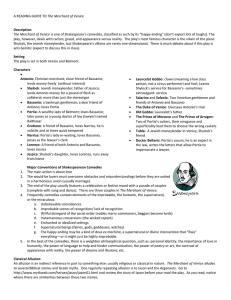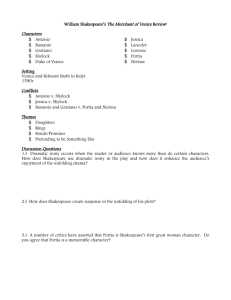The Merchant of Venice Pack
advertisement
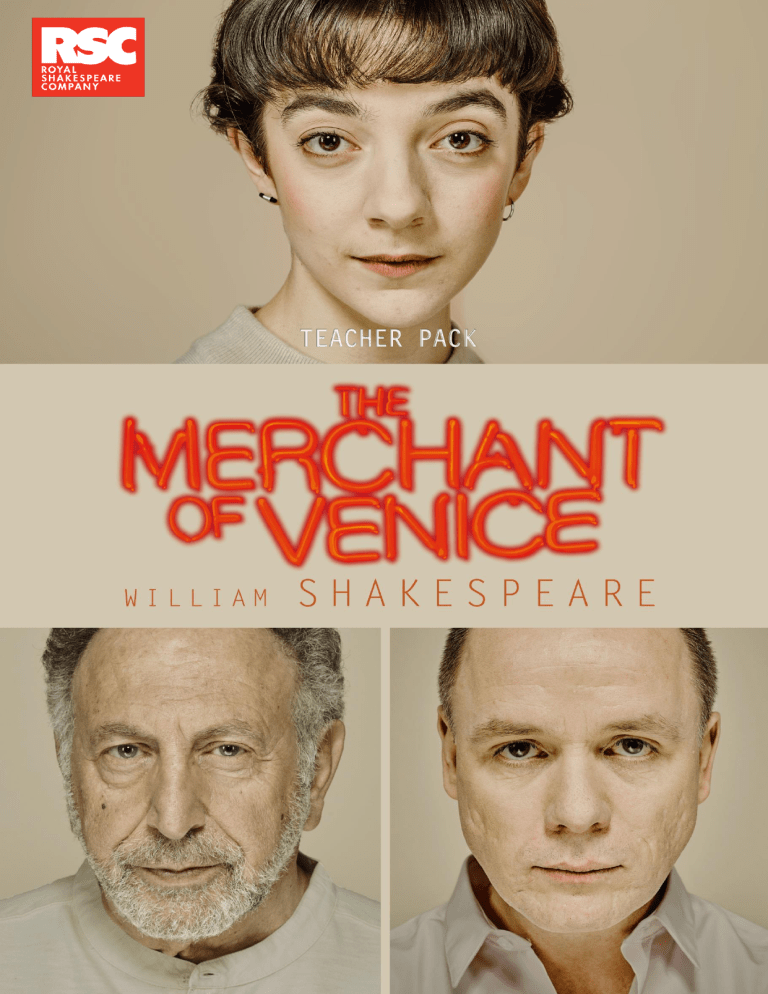
- 1 Registered charity no. 212481 © Royal Shakespeare Company ABOUT THIS PACK This pack supports the RSC’s 2015 production of The Merchant of Venice, directed by Polly Findlay, which opened on 14th May at the Royal Shakespeare Theatre in Stratford-upon-Avon. The activities provided are specifically designed to support KS3-4 students attending the performance. ABOUT YOUNG SHAKESPEARE NATION Over the next six years, the RSC will stage the 36 plays that make up the First Folio of Shakespeare’s work. RSC Education invites you to join us on this inspirational journey in a new initiative called Young Shakespeare Nation. Whether you want to teach a new play or teach in a new way, Young Shakespeare Nation can give you the tools and resources you need. Find inspiration online with images, video’s, more teacher packs and resources at www.rsc.org.uk/education Participate in our schools’ broadcast series, continuing with Henry V on 19 November 2015 Explore a new text or a new way of teaching through our CPD programme Try one of our range of courses for teachers and students in Stratford-upon-Avon. Find out more at www.rsc.org.uk/education These symbols are used throughout the pack: CONTENTS About this Pack Page 2 Exploring the Story Page 3 The Republic of Venice Page 4 Status and Wealth Page 6 Hazarding Page 8 Justice and the Resolution Page 10 Resources Page 11 READ Notes from the production, background info or extracts ACTIVITY A practical or open space activity WRITE A classroom writing or discussion activity LINKS Useful web addresses and research tasks - 2 Registered charity no. 212481 © Royal Shakespeare Company EXPLORING THE STORY NOTES FROM THE REHEARSAL ROOM Work on the text began with director Polly Findlay introducing the company to 'uniting': working through the script, discovering where they felt 'the air in the room had changed' and organising the whole play into ‘units’. They then spent time thinking about each of those units, giving each of them a title. This gave everyone a really good sense of the progression of the play as a whole and enabled them to think about the objectives of each character in the different units. SYNOPSIS While the production is on, a full synopsis of the play is available at: http://www.rsc.org.uk/whats-on/the-merchant-of-venice/synopsis.aspx ACTIVITY 1: THE STORY IN TEN UNITS (PAGES 11-14) The following activity will introduce students to the play and ensure that the whole group is familiar with the story. It is also an opportunity to introduce some of the key questions that will be explored in more depth in later activities. Divide students into small groups. 2-3 PER GROUP Using the ‘Story in Ten Units’ Resource in this pack, assign a scene to each group. Ask each group to create a short performance of their scene, using the lines from the text provided. o If they were going to title their unit, in the way the company did – what title would they give it? What is the objective of each character in their unit? Encourage students to incorporate the scene description into their performance. This could be done by one student taking on the role of narrator, or this role could be shared amongst the group. Once the groups have had an opportunity to rehearse, ask each group to perform their scene, following the order in which the units take place in the play. After watching, discuss with students: o Who are the main characters? o What are the most significant events? o Whose journey did they find most interesting? o Do they think the play has a happy ending? For whom? Makram J. Khoury as Shylock and Gwilym Lloyd as Tubal in The Merchant - 3 of Venice. Photo by Hugo Glendinning Registered charity no. 212481 © Royal Shakespeare Company - You may also want to share the online synopsis with students to see if they would have split the play into different units. ACTIVITY 2: SOCIETY PORTRAITS (PAGE 15) Societal structure and hierarchy are incredibly important within The Merchant of Venice, and the company spent a lot of time exploring how this would affect relationships between characters. The following activity will help students to familiarise themselves with the characters and to think about how each character relates to the others in the play. Divide students into four groups of 6-7 students in each Using the short character descriptions in the Resources, ask each group to create a ‘society portrait’ with a number of different characters. When creating their portrait, encourage them to think about how each character relates to the others in their group: do they like them? Dislike them? Admire them? Look down on them? Invite them also to consider their character’s age, their state of health, their mood, their social status and how wealthy they are. How might each of these affect the way they present themselves? o Polly spent time in rehearsal exploring status, and the differences that might exist between servants and masters. Encourage students to think about this in their portraits as well; how can they show these levels? Then, ask each group to show their ‘photo’ to the other students. Can the other students identify who each character is? What were the clues? Finally, discuss as a whole group: o o o What natural groups do the characters fall into? What brings characters together or drives them apart? What gives a character their social status? THE REPUBLIC OF VENICE The Merchant of Venice was written in 1595. At this time, the Republic of Venice was the greatest trading port in the world. Its merchants traded cloths, silks, luxury goods, spices, and more, with people from all over the world. The citizens enjoyed many parties and masquerades (masked balls). The Rialto was the financial and commercial heart of the city and Venice’s trading hub. Venice was a Christian republic. The Venetian Republic had to live there. from the Venetian "ghèto". Once they clothing, such as a yellow circle or Venetian Ghetto was instituted in 1516, and all Jews in the It was the first Ghetto, and the English word is derived left the ghetto they still had to wear distinguishing scarf. Jews were only allowed to work in certain jobs: as money lenders, at pawn shops, trading in textiles or practising medicine. There were laws that kept the interest rates low and made their - 4 Registered charity no. 212481 © Royal Shakespeare Company jobs more difficult. When loans were taken out, forfeits were created based on what people desired. NOTES FROM THE REHEARSAL ROOM During rehearsals, the company were asked to research different topics and present their findings to the rest of the company. Research topics included historical and C16th thoughts about Jews, domestic service and life in Venetian society. This research helped to inform the company about the time of the play and life in Venice. ACTIVITY 3: PICTURING VENICE Ask students to find images of the ghetto in Venice and of Venetian life at the time of the Republic. This could include Venetian masks (worn for balls), costumes, ships, etc. Invite students to share these images with the rest of the group. Discuss: o What do they find most striking, unusual, or appealing about these images? o What kind of society is suggested by the costumes? Shakespeare had never been to Venice himself and so all of his own ideas would have come from images and impressions. Having researched and collected images, as the company did, challenge students to think about how they would convey the world of Venice on stage. o You might want to share the below images of the 2015 production set with students. Explain to them that designer Johannes Schütz created a very simple set design which meant that the idea of Venice, and the characters’ roles within it, had to be conveyed in other ways. The music in the production, for example, draws heavily on Venetian influences and also creates a sense of sorrow that comes across throughout. o Ask students to think about their own designs. Other than the set and onstage features, how else could they convey a sense of Venice? Nadia Albina as Nerissa, Pasty Ferran as Portia, Ken Nwosu as Morocco and Rina Mahoney as Portia's servant in The Merchant of Venice. Photo by Hugo Glendinning Rina Mahoney as Duke of Venice and Jamie Ballard as Antonio in The Merchant of Venice. Photo by Hugo Glendinning - 5 Registered charity no. 212481 © Royal Shakespeare Company ACTIVITY 4: SHYLOCK AND ANTONIO In the opening Act, we learn about the history between Shylock and Antonio. This sets the context for the rest of the play. Invite students to read through the scene as a whole group. Organise students into pairs and assign each pair one of the highlighted lines in the Resource Materials. Invite them to create a frozen image to represent their line. Ask each pair to share their image to the rest of the group. Discuss: o What do all of the images have in common? o What sort of imagery is being used in this scene? o Why might this imagery be used? WAYS TO EXTEND THIS WORK Ask students to compare this scene with Act 3 scene 3, in which Shylock insists that he will have his bond. Encourage them to identify the imagery in the later scene that echoes this earlier one (for example, ‘dog’, ‘fangs’, and ‘cur’). Discuss how the two scenes echo and reflect each other. How does the relationship between Antonio and Shylock develop? STATUS AND WEALTH In the Venetian Republic, the relationship between wealth and social status is complex. No matter how rich he may be, Shylock will always have low social status and be despised because he is a Jew. It’s only through wealth that he can have any status, and all of this is taken away from him in the end. James Corrigan as Lorenzo and Scarlett Brookes as Jessica in The Merchant of Venice. Photo by Hugo Glendinning NOTES FROM THE REHEARSAL ROOM In the rehearsal room, the company had photographs of all the costume ideas pinned up on the walls. As the set design was very minimal, the actors and director were incredibly aware of the significance of props and costume in conveying the idea of status. ACTIVITY 5: HATH NOT A JEW EYES? This is one of Shakespeare’s most famous speeches. In this scene, Solanio and Salerio have been taunting Shylock about his daughter Jessica eloping, before telling him that Antonio’s ship has - 6 Registered charity no. 212481 © Royal Shakespeare Company been lost at sea and he cannot pay his debt. This activity offers students an opportunity to experiment with different ways that the other characters might respond to Shylock’s words. Ask one student to read the speech. Ask the other students to play Solanio and Salerio. Every time Shylock asks a question, the others should attempt to interject. Encourage students to try different ways of responding: o Angry o Jeering and mocking o Dismissive o Earnest and sincere Reflect on the differences. How do the others’ responses affect the meaning of Shylock’s speech? Repeat if you wish, with a different student reading Shylock each time. WAYS TO EXTEND THIS WORK Divide students into pairs and ask them to think about how they would create costumes for this play. Ask students to pick a theme for their costumes: e.g. military, school, fashion. They may want to explore the costumes from the 2015 production in the online gallery – http://www.rsc.org.uk/whats-on/themerchant-of-venice/productionphotos.aspx Within their chosen theme, in what ways could they use costume to indicate the different status of characters? ACTIVITY 6: LAUNCELOT’S SPEECH Polly and the company made some very specific choices about how the character of Launcelot, servant to Shylock at the start of the play, delivers his opening speech. Written completely in prose, this speech has a very distinctive style. Who, for instance, is Launcelot speaking to when he makes this speech? Ask four students to volunteer to read the speech, asking students to think about who he might be addressing and what his dilemma is. Explain to students that in rehearsal Voice Coach Nia Lynn worked with the company to explore the dilemma in this speech, thinking about Launcelot’s good conscience and his bad conscience. Set up one side of the room to represent Launcelot’s good conscience and the other his bad conscience. In the rehearsal room they used two mats to do this. Invite one volunteer to re-read the speech aloud again. Ask the rest of the group, as the speech is being read, to move to one side of the room or the other depending on whether or not they think he is listening to his good conscience or his bad conscience. Reflect with students again on who they think the audience might be for this speech. Organise students into small groups of four and ask each one to try reading Launcelot’s monologue in different ways: o To himself o To one audience member o To the whole audience o With Shylock present, but not listening - 7 Registered charity no. 212481 © Royal Shakespeare Company Discuss: o How do the different versions change the scene? o What do the different versions reveal about Launcelot’s character? HAZARDING NOTES FROM THE REHEARSAL ROOM The company began exploring one of the play's central themes - “hazarding" all one has (or risk, to put it simply) through the experience of gambling. They played lots of different card games and board games and even had a trip to Wimbledon Dog Races. They also played a game called ‘9 Square’ – a combination of tennis and volleyball – that became ever more competitive as rehearsals continued! Risk is a major theme of the play. Portia’s suitors, including Bassanio, have to guess which casket they should choose to win her hand, and they risk losing not only the opportunity to marry her, but also the right to woo any other woman. Ask students to think about all the moments in the play where someone risks something, or takes a gamble. How many of these moments are there? Reflect with students on which of the risks that are taken actually pay off; are any of the characters successful as a result? ACTIVITY 7: PORTIA’S SPEECH TO BASSANIO – I, ME, YOU, YOURS In this speech, Portia addresses Bassanio before he picks a casket. Bassanio is taking a big risk here; how does Portia try to influence the outcome? Divide the students into two groups. One group are the ‘men’, the other group are the ‘women’. Ask one student to read aloud Portia’s speech (from “I pray you tarry…” to “stay you from election” ) Now, ask another student to read the speech again. This time, all the men say the words “you”, “your” with Portia; all the women say “I”, “me” with Portia. Discuss: o What does this tell us about what Portia is saying? o What is she trying to emphasise? - 8 Registered charity no. 212481 © Royal Shakespeare Company WAYS TO EXTEND THIS WORK This speech uses Iambic Pentameter. Read the speech aloud as a group, and ask students to beat the rhythm of the speech whilst speaking the lines. Ask students: What do they notice about the rhythm? Why might it be written in this meter? ACTIVITY 8: PORTIA’S COURTROOM SPEECH NOTES FROM THE REHEARSAL ROOM The trial scene was identified by the company as a pivotal scene in the play and Polly spent time with the actors considering what impact Portia’s appearance in the scene might have. They experimented with different ways that the rest of the characters in the scene might respond when she enters; treating her like a 12 year old, or as though she’s Jesus walking into the room. Each of these different interpretations changed the scene considerably. In the following activity, students take it in turns to read Portia’s first courtroom speech (which can be found in the Resource Materials) while the others respond, thinking about the different possible reactions they could have. WAYS TO EXTEND THIS WORK Invite the group to form a large circle, with a chair placed in the middle. Try the same exercise with Portia’s Ask the student playing Portia to take the second speech to Shylock in the chair in the middle. courtroom, from: “Tarry, Jew. The law Explain to the other students that they will hath yet another hold on you.” to “Down not only be listening to Portia, but will therefore, and beg mercy of the Duke.” also act as a ‘Chorus’. As Portia speaks Ask students to consider the theme of they will need to react to the things she mercy in the two speeches: How do the says, based on a range of different levels two speeches compare? Is Portia’s idea of response - going from Level 1 (quietest) of mercy consistent throughout? to Level 5 (loudest). o You might want to practice this scale with the students to make sure they’re comfortable with the different levels. Discuss when they think a level 1 response might be used and when a level 5 response might be used. Ask the group to begin with a ‘background’ noise level of 0.5 as Portia speaks. Invite them to then interrupt and respond to the things she says, either with the words ‘yes’ or ‘no’ or by repeating her words. Reflect back with students on the points in the speech where the chorus all seemed to use the same noise level. Why did they make those collective choices? Where there any points where the noise levels differed or only a few people reacted; why might those moments have been seen differently? - 9 Registered charity no. 212481 © Royal Shakespeare Company JUSTICE AND THE RESOLUTION The ending of this play is one of the most controversial in Shakespeare’s work. Questions that you might encourage students to ask include: Has justice been done? For whom? Why/why not? Is it a happy ending? What do you think happens to Shylock at the end? The cast of The Merchant of Venice. Photo by Hugo Glendinning ACTIVITY 9: WHAT HAPPENS NEXT? Divide students into small groups. Ask each group to choose a character and to create an additional scene to continue that character’s story. Encourage them to consider the last time the character appears in the play text, what mood they are in, what has just happened to them, and what we are expecting to happen next. Share their scenes with the rest of the group and discuss. Alternatively, students could write their scenes individually. All rights reserved. No part of this publication may be reproduced, distributed, or transmitted in any form or by any means, including photocopying, recording, or other electronic or mechanical methods, without the prior written permission of the publisher, except in the case of brief quotations embodied in critical reviews and certain other noncommercial uses permitted by copyright law. For permission requests, write to the publisher, addressed “Attention: RSC Education” at the address below. The Royal Shakespeare Company 3, Chapel Lane Stratford on Avon Warwickshire CV37 6BE www.rsc.org.uk - 10 Registered charity no. 212481 © Royal Shakespeare Company RESOURCES THE STORY IN TEN SCENES 1. Antonio, the merchant of Venice, agrees to lend his friend Bassanio three thousand ducats so that Bassanio can woo Portia of Belmont. BASSANIO To you, Antonio, I owe the most in money and in love, And from your love I have a warranty To unburden all my plots and purposes How to get clear of all the debts I owe. ANTONIO … My purse, my person, my extremest means, Lie all unlocked to your occasions. 2. Portia, a rich and beautiful young woman, complains to her waiting-woman, Nerissa, that she hates all of the suitors who are seeking to marry her. Portia's father has decreed that she will marry whichever suitor makes the correct choice when presented with three caskets, made of gold, silver and lead. She tells Nerissa that she is in love with Bassanio. NERISSA But what warmth is there in your affection towards any of these princely suitors that are already come? … PORTIA … There is not one among them but I dote on his very absence, and I wish them a fair departure. - 11 Registered charity no. 212481 © Royal Shakespeare Company 3. Antonio can’t access his own money until his ships return safely from sea, so he borrow the money from the Jewish moneylender Shylock, whom he has previously treated very badly. Shylock agrees to lend the money but only on the basis that if the loan is not repaid he will be entitled to a pound of Antonio’s flesh. SHYLOCK Shall I bend low and in a bondman’s key, With bated breath and whisp’ring humbleness, Say this: ‘Fair sir, you spat on me on Wednesday last; You spurned me such a day; another time You called me dog, and for these courtesies I’ll lend you thus much moneys’? ANTONIO I am as like to call thee so again, To spit on thee again, to spurn thee too. If thou wilt lend this money, lend it not As to thy friends, for when did friendship take A breed of barren metal of his friend? But lend it rather to thine enemy 4. Portia’s suitors Morocco and Aragon choose the wrong caskets, gold and silver, but Bassanio chooses the right one: lead. He is overjoyed and so is Portia. They get married, and his friend Gratiano marries Portia's lady-in-waiting Nerissa at the same time. Nerissa and Portia give their husbands rings, which they promise to keep forever. PORTIA …This house, these servants and this same myself Are yours, my lord. I give them with this ring, Which when you part from, lose or give away, Let it presage the ruin of your love And be my vantage to exclaim on you. Puts a ring on his finger BASSANIO … when this ring Parts from this finger, then parts life from hence. - 12 Registered charity no. 212481 © Royal Shakespeare Company 5. Shylock’s daughter, Jessica, is secretly planning to run away with a Christian, Lorenzo. She dresses as a boy and escapes while her father is out for dinner, stealing Shylock’s money and his jewels, including her dead mother’s ring. LORENZO So you are, sweet, Even in the lovely garnish of a boy. But come at once, For the close night doth play the runaway, And we are stayed for at Bassanio’s feast. JESSICA I will make fast the doors and gild myself With some more ducats, and be with you straight. 6. News arrives that Antonio's ships have been lost; he is unable to pay his debt. Shylock insists that Antonio be jailed and that he wants to have his bond. SOLANIO The good Antonio, the honest Antonio — O that I had a title good enough to keep his name company! —hath lost a ship. … ANTONIO Hear me yet, good Shylock. SHYLOCK I’ll have my bond. Speak not against my bond, I have sworn an oath that I will have my bond. Thou calledst me dog before thou hadst a cause, But since I am a dog, beware my fangs. 7. Portia and Nerissa disguise themselves as men in order to defend Antonio in the court case. Portia dresses up as Balthasar, a young lawyer, and Nerissa as his clerk. Unknown to their husbands, they dress up and travel from Belmont to Venice. PORTIA Come on, Nerissa, I have work in hand That you yet know not of; we’ll see our husbands Before they think of us. NERISSA Shall they see us? PORTIA They shall, Nerissa, but in such a habit, That they shall think we are accomplishèd With that we lack. - 13 Registered charity no. 212481 © Royal Shakespeare Company 8. Shylock’s claim to his pound of flesh is heard in the law court before the duke Disguised as a man, Portia argues that Shylock is entitled to his pound of flesh but he must not spill a drop of Antonio's blood, and he must cut exactly one pound of flesh, not an ounce more or less. She then says that Shylock should forfeit his life for having conspired against the life of a Venetian. PORTIA Tarry a little, there is something else. This bond doth give thee here no jot of blood, The words expressly are ‘a pound of flesh’. 9. The duke pardons Shylock on condition that he gives half his wealth to Antonio and half to the state. Antonio gives up his half on the condition that Shylock converts to Christianity and leaves all his property to his daughter Jessica and her Christian lover, Lorenzo. DUKE For half thy wealth, it is Antonio’s, The other half comes to the general state, Which humbleness may drive unto a fine. SHYLOCK Nay, take my life and all. Pardon not that. You take my house when you do take the prop That doth sustain my house. You take my life When you do take the means whereby I live. 10. Portia and Nerissa return to Belmont, where they confront their husband about the rings they gave them, that the men promised to keep forever. Eventually they reveal that ‘Balthasar’ and the clerk were the women in disguise. BASSANIO GRATIANO NERISSA Were you the doctor and I knew you not? Were you the clerk that is to make me cuckold? Ay, but the clerk that never means to do it, Unless he live until he be a man. - 14 Registered charity no. 212481 © Royal Shakespeare Company CHARACTERS ANTONIO, a merchant of Venice. At the beginning of the play Antonio is depressed and anxious about his ships. The good Antonio, the honest Antonio — O that I had a title good enough to keep his name company! BASSANIO, his friend, suitor to Portia. A scholar and a soldier. He, of all the men that ever my foolish eyes looked upon, was the best deserving a fair lady. LORENZO, friend of Antonio and Bassanio. He falls in love with Shylock’s daughter Jessica and they elope together. GRATIANO, friend of Antonio and Bassanio. He marries Nerissa. SALERIO } friends of SOLANIO } Antonio and Bassanio PORTIA, an heiress. Lady of Belmont. Portia is intelligent, learned and beautiful. In Belmont is a lady richly left, And she is fair and, fairer than that word, Of wondrous virtues. NERISSA, her gentlewoman-in-waiting. Prince of ARAGON and Prince of MOROCCO, suitors to Portia, who choose the wrong caskets. SHYLOCK, a Jew of Venice. Shylock is a moneylender who is treated badly by Antonio and his friends, and when Antonio fails to repay his debt, Shylock seeks revenge. He is insistent that he wants justice done. JESSICA, his beautiful daughter. She elopes with her Christian lover, Lorenzo, stealing her father’s money. Fair Jessica shall be my torchbearer. TUBAL, a Jew, his friend. Tubal supports Shylock when Jessica runs away. Tubal, a wealthy Hebrew of my tribe, Will furnish me LAUNCELOT GOBBO, the clown, servant to Shylock and later Bassanio. Assists with Jessica and Lorenzo’s elopement. - 15 Registered charity no. 212481 © Royal Shakespeare Company ACT 1 SCENE 3 EXTRACT (Edited by RSC Education) ANTONIO Mark you this, Bassanio, The devil can cite Scripture for his purpose. An evil soul producing holy witness Is like a villain with a smiling cheek, A goodly apple rotten at the heart. O, what a goodly outside falsehood hath! SHYLOCK Three thousand ducats, ’tis a good round sum. Three months from twelve, then let me see, the rate — ANTONIO Well, Shylock, shall we be beholding to you? SHYLOCK Signor Antonio, many a time and oft In the Rialto you have rated me About my moneys and my usances. Still have I borne it with a patient shrug, For sufferance is the badge of all our tribe. You call me misbeliever, cut-throat dog, And spit upon my Jewish gaberdine, And all for use of that which is mine own. Well then, it now appears you need my help. Go to, then. You come to me and you say ‘Shylock, we would have moneys’ — you say so, You that did void your rheum upon my beard, And foot me as you spurn a stranger cur Over your threshold. Moneys is your suit. What should I say to you? Should I not say, ‘Hath a dog money? Is it possible A cur should lend three thousand ducats?’ Or Shall I bend low and in a bondman’s key, With bated breath and whisp’ring humbleness, Say this: ‘Fair sir, you spat on me on Wednesday last; You spurned me such a day; another time You called me dog, and for these courtesies I’ll lend you thus much moneys’? - 16 Registered charity no. 212481 © Royal Shakespeare Company ACT 3 SCENE 1 EXTRACT (Edited by RSC Education) Shylock’s Speech SHYLOCK He hath disgraced me, and hindered me half a million, laughed at my losses, mocked at my gains, scorned my nation, thwarted my bargains, cooled my friends, heated mine enemies, and what’s the reason? I am a Jew. Hath not a Jew eyes? Hath not a Jew hands, organs, dimensions, senses, affections, passions? Fed with the same food, hurt with the same weapons, subject to the same diseases, healed by the same means, warmed and cooled by the same winter and summer, as a Christian is? If you prick us, do we not bleed? If you tickle us, do we not laugh? If you poison us, do we not die? And if you wrong us, shall we not revenge? If we are like you in the rest, we will resemble you in that. If a Jew wrong a Christian, what is his humility? Revenge. If a Christian wrong a Jew, what should his sufferance be by Christian example? Why, revenge. The villainy you teach me I will execute, and it shall go hard but I will better the instruction. - 17 Registered charity no. 212481 © Royal Shakespeare Company ACT 2 SCENE 2 EXTRACT (Edited by RSC Education) Launcelot’s Speech Enter the Clown Launcelot alone LAUNCELOT Certainly my conscience will serve me to run from this Jew my master. The fiend is at mine elbow and tempts me, saying to me, ‘Gobbo, Launcelot Gobbo, good Launcelot’, or ‘good Gobbo’, or ‘good Launcelot Gobbo, use your legs, take the start, run away’. My conscience says, ‘No; take heed, honest Launcelot, take heed, honest Gobbo’, or, as aforesaid, ‘honest Launcelot Gobbo, do not run, scorn running with thy heels’. Well, the most courageous fiend bids me pack: ‘Fia!’ says the fiend, ‘away!’ says the fiend, ‘for the heavens, rouse up a brave mind’, says the fiend, ‘and run’. Well, my conscience, hanging about the neck of my heart, says very wisely to me, ‘My honest friend Launcelot, being an honest man’s son’, or rather an honest woman’s son — for indeed my father did something smack, something grow to, he had a kind of taste — well, my conscience says ‘Launcelot, budge not’. ‘Budge’, says the fiend. ‘Budge not’, says my conscience. ‘Conscience’, say I, ‘you counsel well’. ‘ Fiend’, say I, ‘you counsel well’. To be ruled by my conscience, I should stay with the Jew my master, who, God bless the mark, is a kind of devil; and to run away from the Jew, I should be ruled by the fiend, who, saving your reverence, is the devil himself. Certainly the Jew is the very devil incarnation, and in my conscience, my conscience is a kind of hard conscience to offer to counsel me to stay with the Jew; the fiend gives the more friendly counsel. I will run, fiend. My heels are at your commandment. I will run. O rare fortune! Here comes Master Bassanio, who, indeed, gives rare new liveries. If I serve not him, I will run as far as God has any ground. To him, for I am a Jew if I serve the Jew any longer . - 18 Registered charity no. 212481 © Royal Shakespeare Company ACT 3 SCENE 2 EXTRACT (Edited by RSC Education) Portia’s Speech to Bassanio – I, Me, You, Your PORTIA I pray you tarry. Pause a day or two Before you hazard, for in choosing wrong I lose your company: therefore forbear awhile. There’s something tells me, but it is not love, I would not lose you, and you know yourself, Hate counsels not in such a quality; But lest you should not understand me well — I would detain you here some month or two Before you venture for me. I could teach you How to choose right, but then I am forsworn. So will I never be. So may you miss me. But if you do, you’ll make me wish a sin, That I had been forsworn. Beshrew your eyes, They have o’erlooked me and divided me. One half of me is yours, the other half yours, Mine own, I would say. But if mine, then yours, And so all yours. O, these naughty times Puts bars between the owners and their rights! And so, though yours, not yours. Prove it so, Let fortune go to hell for it, not I. I speak too long, but ’tis to peise the time, To eke it and to draw it out in length, To stay you from election. - 19 Registered charity no. 212481 © Royal Shakespeare Company ACT 4 SCENE 1 EXTRACT (Edited by RSC Education) Portia’s Courtroom Speech PORTIA The quality of mercy is not strained, It droppeth as the gentle rain from heaven Upon the place beneath. It is twice blest: It blesseth him that gives and him that takes. ’Tis mightiest in the mightiest, it becomes The thronèd monarch better than his crown. His sceptre shows the force of temporal power, The attribute to awe and majesty, Wherein doth sit the dread and fear of kings. But mercy is above this sceptred sway, It is enthronèd in the hearts of kings, It is an attribute to God himself; And earthly power doth then show likest God’s When mercy seasons justice: therefore, Jew, Though justice be thy plea, consider this, That in the course of justice, none of us Should see salvation. We do pray for mercy, And that same prayer doth teach us all to render The deeds of mercy. I have spoke thus much To mitigate the justice of thy plea, Which if thou follow, this strict court of Venice Must needs give sentence ’gainst the merchant there. - 20 Registered charity no. 212481 © Royal Shakespeare Company
